The term ‘Explosive Ordnance Risk Education’ (EORE) refers to activities which seek to reduce the risk of injury from explosive ordnance by raising awareness of women, girls, boys and men in accordance with their different vulnerabilities, roles and needs, and promoting behavioural change. (IMAS 12.10).
The objective is to reduce the risk to a level where people can live safely, thus contributing to an environment where economic and social development can occur free from the constraints imposed by explosive ordnance contamination. In recent years, high numbers of civilian casualties from explosive ordnance have been recorded. Effective EORE interventions with affected individuals and communities – in addition to other risk reduction programmes – are critical to prevent injuries and save lives.
To contribute to enhancing the protection of civilians, the GICHD has strengthened its EORE efforts, in support of partners across the mine action and wider humanitarian and protection sectors.
What does the GICHD do in EORE?
The GICHD follows a multi-pronged approach that entails global, regional and country-specific EORE advice, technical assistance, exchange of good practice, research, and innovation.
Support to partners is strengthened through the mainstreaming of EORE into the GICHD’s four lines of service: capacity development and advice, multilateral work on norms and standards, facilitation of dialogue and cooperation, and research and development focused on innovative EORE solutions.
The EORE programme at the GICHD works towards:
- Reinforcing capacity for locally-led responses
- Developing and promoting innovative EORE responses to address challenges
- Increasing commitments and resources allocated to EORE

At the global level, the GICHD contributes to strengthening the profile of EORE through its role as secretariat and core member of the EORE Advisory Group, as well as convention-related support (Anti-Personnel Mine Ban Convention, Convention on Cluster Munitions) and the production of sector-wide resources for practitioners.
At the regional and country level, the GICHD provides EORE-specific support, both directly to its partners and through other means, such as within the framework of mine action strategic planning processes, the drafting and/or revision of international and national standards, the facilitation of exchange of good practices and the mainstreaming of gender, diversity and inclusion considerations.
Introduction to EORE Essentials
Objective:
This introductory course is for anyone interested in learning about the key principles of effective and ethical risk education. It is intended to support mine action practitioners and stakeholders from other sectors to identify why EORE matters and how it can be integrated beyond humanitarian mine action.
Duration: approximately 60 to 90 minutes
Languages: Arabic, English, French and Ukrainian
‘Advanced EORE’ e-learning
Objective:
This Advanced EORE course is primarily for EORE practitioners. It is intended to support EORE practitioners to acquire common foundations on the EORE project cycle: planning & analysis, design, implementation and monitoring, evaluation, accountability and learning (MEAL).
Duration: approximately 8 hours
Languages: English and French
IMAS 12.10 – Explosive Ordnance Risk Education
Find out more about the latest version of the International Mine Action Standard (IMAS) on EORE, updated in 2020. Available in Arabic, English, French, Korean, Russian and Vietnamese.
TNMA 12.10/01 - Risk Education for Improvised Explosive Devices
Read more about specific considerations for the effective assessment, planning, implementation, management, monitoring, and evaluation of risk education for IEDs.
TNMA 05.10/01 - Measurement and reporting of beneficiaries
This Technical Note for Mine Action provides additional guidance on the measurement and reporting of beneficiaries defined in IMAS 05.10, Annex B., including for EORE activities.
EORE in Conventions
Convention on Cluster Munitions (CCM): Find out more about the Lausanne Action Plan (2021-2026), including Section VI dedicated to risk education (actions #27-30).
Anti-Personnel Mine Ban Convention (APMBC): Find out more about the Oslo Action Plan (2019-2024), including Section VI on mine risk education and reduction (actions #28-32).
EORE Advisory Group
The EORE Advisory Group (AG) is a group of over a dozen organisations that provides overall guidance to the sector and identifies ways to improve the integration, effectiveness, efficiency, and relevance of EORE. Find out more about the advisory group, its two-year workplan and a wealth of resources for practitioners
EORE Publications
Le transfert de responsabilités des terres remises à disposition | Procédures communes et bonnes pratiques
Ce rapport est basé sur les résultats d'études de cas dans huit pays. La recherche a été menée par GMAP et le CIDHG.Il inclut des procédures de remise des terres, des directives et des normes. Il rassemble également les bonnes...
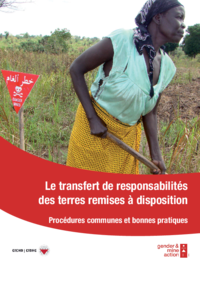
- Available in French
Handover of released land | Common Procedures and Good Practices | in Arabic
This report is based on the findings of eight country case studies. The research was carried out by GMAP and the GICHD.
It includes handover procedures and policies and standards. It also consolidates good practice and lessons...
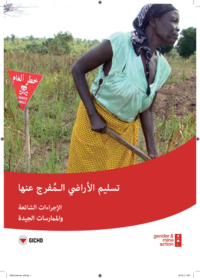
- Available in Arabic
Mission creep or responding to wider security needs? The evolving role of mine action organisations in Armed Violence Reduction
Since the late 1980s, mine action organisations have focused their efforts on reducing the social, economic and environmental impacts of anti-personnel mines and other explosive remnants of war (ERW) through a broad range of...

- Available in English
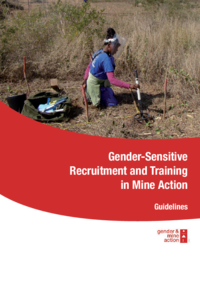
- Available in English
Recrutement et formation sensibles au genre dans l’action contre les mines - Directives
Ces directives ont été élaborées pour aider les Autorités nationales de l’action antimines (ANAM), les organisations nongouvernementales (ONG), les agences des Nations Unies, les organisations nationales, les sociétés commerciales...
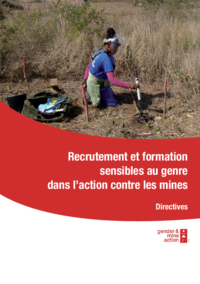
- Available in French
Linking Mine Action and Development | Guidelines for Mine/ERW Operators
Mine action programmes often are not linked early and strongly enough with key development actors. Despite the availability of extensive research documenting the need for greater coordination between mine action and development...

- Available in English
Linking Mine Action and Development | States Affected by Mines/ERW
Mine action programmes often are not linked early and strongly enough with key development actors. Despite the availability of extensive research documenting the need for greater coordination between mine action and development...

- Available in English
Linking Mine Action and Development | Official Development Cooperation Agencies
Mine action programmes often are not linked early and strongly enough with key development actors. Despite the availability of extensive research documenting the need for greater coordination between mine action and development...
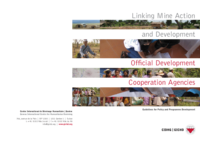
- Available in
Linking Mine Action and Development | National Mine Action Centres
Mine action programmes often are not linked early and strongly enough with key development actors. Despite the availability of extensive research documenting the need for greater coordination between mine action and development...
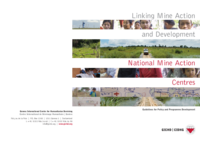
- Available in
Displaying results 21 to 30 out of 36
- « Previous
- 1
- 2
- 3
- 4
- Next »
At the Lebanon Mine Action Centre, we encourage all our staff involved in humanitarian operations to complete the full GICHD EORE e-learning journey in order to improve the development and implementation of EORE interventions and to further support the integration of risk education in our mine action operations.





